Articles
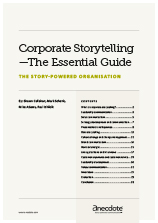
 Corporate Storytelling—The Essential Guide
Corporate Storytelling—The Essential Guide
The definitive guide to corporate storytelling, also called business storytelling, the purposeful and systematic application of story techniques in an organisation to deliver business outcomes.
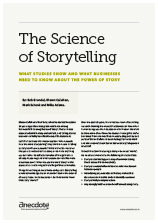 The Science of Storytelling
The Science of Storytelling
Over the past 50 years, fascinating research has revealed the impact stories can have when human beings use them to communicate. In this article, we summarise our favourite studies.
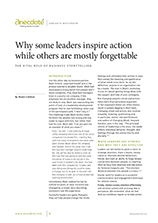 The vital role of business storytelling
The vital role of business storytelling
Leaders can use storytelling to convey values, share lessons or explain a strategic direction. They can use storytelling to forge deeper connections between people and to inspire them to focus their attention and take action.
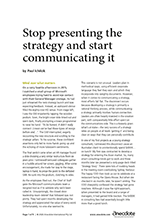 Stop presenting your strategy and start communicating it
Stop presenting your strategy and start communicating it
Leaders are often heavily invested in the creation of a new strategy, with comparatively little effort spent on the communications side. This is a travesty given what’s at stake—the very success of a strategy relies on people at all levels ‘getting it’.
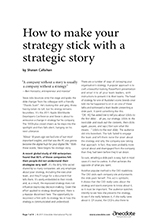 How to make your strategy stick with a strategic story
How to make your strategy stick with a strategic story
Research has shown that most employees don’t understand their organisation’s strategy. You can reconnect employees with your strategy by converting it into a strategy story and gaining the skills to tell that story in an clear, memorable way.
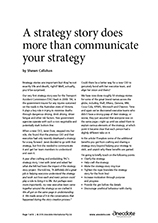 Strategy stories do more than communicate strategy
Strategy stories do more than communicate strategy
Strategy stories are not only an effective way to communicate strategy. They have many other benefits for the organisations which choose to create and share them.
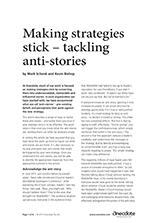 Making strategies stick—tackling anti-stories
Making strategies stick—tackling anti-stories
For every official story told in an organisation, there are often anti-stories—pre-existing beliefs and perceptions that work against your objectives. Identifying and tackling these anti-stories is a critical part of any new strategy.
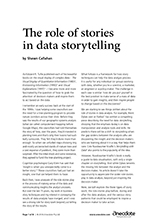 The role of stories in data storytelling
The role of stories in data storytelling
There is a chasm between finding an insight in data and influencing a decision-maker to act on it. You can bridge that gap with storytelling. Stories connect data and establish meaning. They bring data to life.
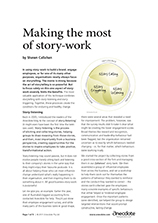 Making the most of story-work
Making the most of story-work
The use of story-work is becoming increasingly popular within organisations for many different purposes, like employee engagement. The act of storytelling is indeed very powerful, but to focus solely on this one aspect of story-work limits its benefits.
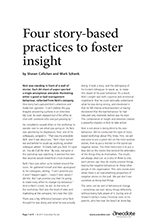 Four story-based practices to foster insight
Four story-based practices to foster insight
Confirmation bias has it that we are unlikely to change our opinions or behaviours unless we experience a new way of thinking. We can experience this new way of thinking first-hand or vicariously through the sharing of stories.